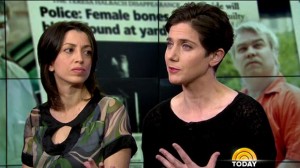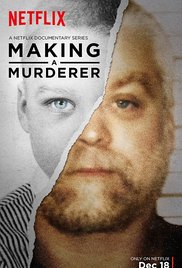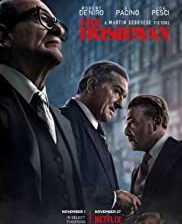- Two Thanksgiving Thoughts for the ACAPosted 10 years ago
- Shop til you Drop at the Healthcare Marketplace Part 2: Frustration!Posted 10 years ago
- An Early Casualty in the Affordable Care FightPosted 10 years ago
- Some Good News for a ChangePosted 10 years ago
Everyone Should See “Making a Murderer”
Several weeks ago I saw headlines about Alec Baldwin’s enthusiastic live Tweets on the compelling 10-part Netflix documentary “Making a Murderer.” I had noticed it on Netflix as a recent addition but was too much in the stupor I always go into during the holidays, where I almost exclusively watch Christmas-themed movies, TV specials and TV episodes. I didn’t read the Baldwin article but made a note to myself that I’d watch the documentary, which I started Saturday, January 2. At first I thought it was a single film and, when I saw that it was instead a series, I was curious about how the subject matter needed the span of ten episodes to make its point.
If it wasn’t for my need for sleep, I’d have taken less than the three days it took me to watch “Making a Murderer.” Set in rural Wisconsin, it’s about Steven Avery, who was convicted of rape and assault in 1985 and spent 18 years in prison before DNA evidence exonerated him. He subsequently and successfully sued local law enforcement. Several years later, he (along with his nephew) was charged, convicted and imprisoned for a 2005 murder. The documentary convincingly implies the evidence used against Avery was planted by the same law enforcement officials he sued. As a result of the film’s release, more than 250,000 signatures are on a petition to get Avery pardoned. In an interview with the film makers after its release, a juror from the trial said the jury submitted a guilty vote because they feared for their lives and that if there is a retrial, “it should take place far away from Wisconsin”, whose justice system takes corruption to a new level, or at least one most of us are not familiar with. Here’s a January 6 Time magazine interview with the film makers, Laura Ricciardi and Moira Demos (below right): http://time.com/4167915/making-a-murderer-steven-avery-juror/
 “Making a Murderer” is so powerful in both presentation and content that it might be the best film production of any type this year. The series has transcended entertainment and itself is news. I didn’t miss one frame of film or one word of what was said (using subtitles just to make sure) or captioned. At the end of each episode, you’ll want to discuss what happened before going on to the next one. The interview and courtroom footage is phenomenal, as though the film makers knew they were capturing a huge and unbelievable story as it unfolded. As soon as I finished the last episode I went back to the first one to refresh myself on how it all started.
“Making a Murderer” is so powerful in both presentation and content that it might be the best film production of any type this year. The series has transcended entertainment and itself is news. I didn’t miss one frame of film or one word of what was said (using subtitles just to make sure) or captioned. At the end of each episode, you’ll want to discuss what happened before going on to the next one. The interview and courtroom footage is phenomenal, as though the film makers knew they were capturing a huge and unbelievable story as it unfolded. As soon as I finished the last episode I went back to the first one to refresh myself on how it all started.
 My opinion of defense lawyers is much more favorable as a result of watching “Making a Murderer.” With the money he won in the lawsuit, Avery was able to get Wisconsin’s two best defense attorneys, Dean Strang and Jerry Buting (left), who have become internet celebrities. The two, especially Strang, come across as smart, experienced, thoughtful and passionate about their case and their interviews are among the most fascinating moments of the story. That’s saying something, because the entire production is fascinating. Conversely, I’d be surprised if the law enforcement officials, prosecutors and judges involved don’t go into hiding.
My opinion of defense lawyers is much more favorable as a result of watching “Making a Murderer.” With the money he won in the lawsuit, Avery was able to get Wisconsin’s two best defense attorneys, Dean Strang and Jerry Buting (left), who have become internet celebrities. The two, especially Strang, come across as smart, experienced, thoughtful and passionate about their case and their interviews are among the most fascinating moments of the story. That’s saying something, because the entire production is fascinating. Conversely, I’d be surprised if the law enforcement officials, prosecutors and judges involved don’t go into hiding.
Because this isn’t a review of “Making a Murderer” as much as me just wanting to comment on it, I’m not divulging details in my synopsis of “Making a Murderer.” Better to say everyone in this country should see it as an example of how unlawful law enforcement and how unjust the justice system can be. It’s also great film making and story telling along with being extremely educational in its coverage of the law enforcement and justice system processes. It’s so impactful I’m not sure the fictional murder mystery genre will be ever be the same.
You should avoid the ever-increasing news articles about the documentary, the case and the participants before watching “Making a Murderer.” I challenge you to not become emotionally involved and infuriated at what you see and hear.
DPW
January 6, 2016 (Happy New Year!)
_________________________________
Adding to the uniqueness of the production, I inadvertently turned on the audio meant for blind people when I watched the first episode. Along with the dialogue and narration, I heard descriptions of what was on screen, like the fades to black, photo captions, major end credits and even the Netflix end logo. Initially I thought it was a very cool gimmick on the part of the film makers. i’m going to start using that feature from time to time.
SPOILER ALERT:
My theories on what happened:
Even though the evidence against Avery is presented as weak/questionable in supporting his conviction, several things that work against him are:
– One of the minor crimes he was convicted of in his youth was throwing the family cat into a fire, which indicates a callous and perverted disregard for life. That’s significant enough to be taken into consideration, although the jury is limited to what is presented to them during the trial.
– He didn’t take the stand in his defense. I didn’t find his reasoning that he didn’t testify “because everybody knows I’m innocent” sufficient and I think not testifying implied his guilt. It made it seem as though there were factors that were not disclosed to the viewer.
Also, there were several vague references to Avery’s inappropriate and potentially illegal sexual behavior, but it wasn’t clear if there was a factual basis for those accusations.
The other theory is that the victim’s ex-boyfriend, who is shown leading the citizen searches, committed the murder and was in cahoots with local law enforcement in focusing on Avery. The fact that murders are most often committed by someone close to the victims was even mentioned before the ex-boyfriend was introduced to the viewer. I found his demeanor when he was interviewed suspicious because he seemed a bit fidgety and ill at ease.





I do not have Netflix but I am paraphrasing what someone I know said about this series. She said that she found herself yelling at the TV and was dumbfounded by the witnesses. She now questions the criminal justice system and wonders about the constitutional rights that were put in place to protect us. She also added that the series was definitely worth the 10 hours invested.
Thanks Dan. I had no idea about this except the title. Now I want to watch this.